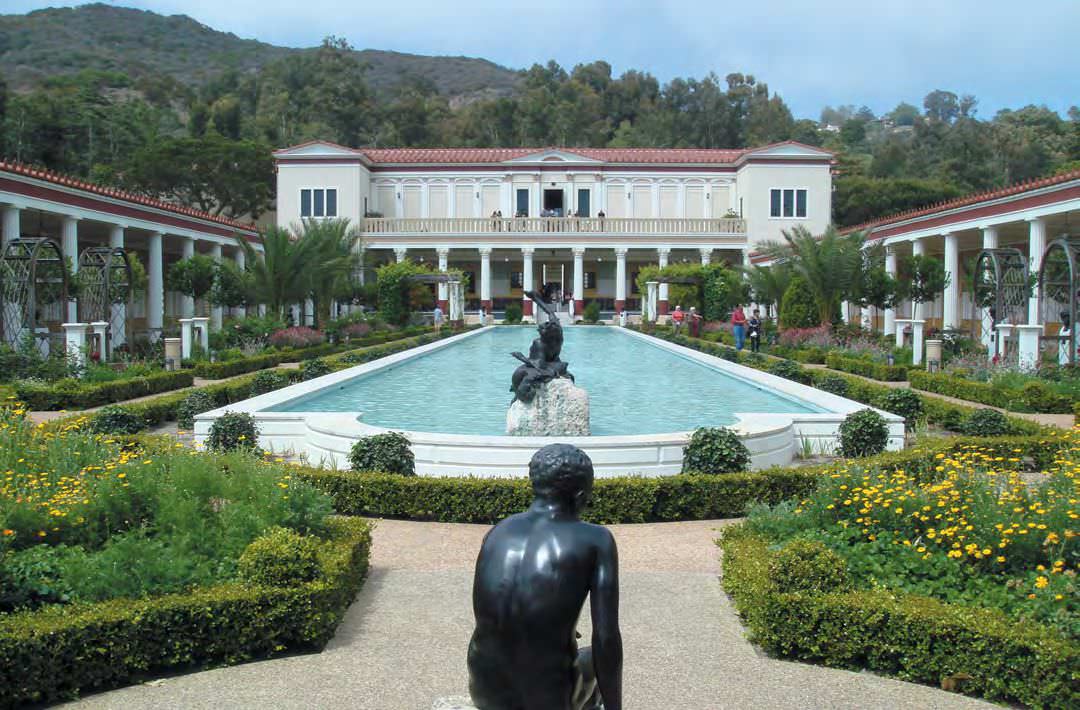Luke Slattery argues that the ancient philosophy of the Garden offers an attractive answer to some of the challenges of the modern world.

An elaborate faux Roman villa, replete with coffered ceilings and a lavish ‘Vesuvian’ color scheme, rises above the Pacific coast at Malibu. Why location scouts didn’t seize upon it for the Coen brothers’ comedy Hail, Caesar is anyone’s guess. But it’s best thought of as another kind of prop. Built by John Paul Getty to house his art collection, the Getty Villa connects the contemporary world with an ancient philosophy that could change the world for the better; or, at least, make a difference. Getty modelled his villa on a partially buried seaside mansion at Roman Herculaneum, a victim of the eruption of Vesuvius in 79 AD. It is known as ‘the Villa of the Papyri’ because it housed a vast collection of papyrus manuscripts. Most of these are on Epicurean themes.
Epicureanism was the world’s first ‘green’ philosophy. When people turn to the ancient therapeutic philosophies, or arts of life, they tend to look to resolute Stoicism for succor. But Epicureanism, which insists that we learn to be happy with less, is a better fit with the anxieties du jour.
The reason Epicureanism is not often mentioned in this context is that for more than two thousand years it has been misunderstood. Today Epicureanism is regarded as a form of gastronomic connoisseurship. In antiquity it was the exact opposite.
This story is from the {{IssueName}} edition of {{MagazineName}}.
Start your 7-day Magzter GOLD free trial to access thousands of curated premium stories, and 9,000+ magazines and newspapers.
Already a subscriber ? Sign In
This story is from the {{IssueName}} edition of {{MagazineName}}.
Start your 7-day Magzter GOLD free trial to access thousands of curated premium stories, and 9,000+ magazines and newspapers.
Already a subscriber? Sign In

Metaphors & Creativity
Ignacio Gonzalez-Martinez has a flash of inspiration about the role metaphors play in creative thought.

Medieval Islam & the Nature of God
Musa Mumtaz meditates on two maverick medieval Muslim metaphysicians.

Robert Stern
talks with AmirAli Maleki about philosophy in general, and Kant and Hegel in particular.

Volney (1757-1820)
John P. Irish travels the path of a revolutionary mind.

IT'S A WONDERFUL LIFE
Becky Lee Meadows considers questions of guilt, innocence, and despair in this classic Christmas movie.

"I refute it thus"
Raymond Tallis kicks immaterialism into touch.

Cave Girl Principles
Larry Chan takes us back to the dawn of thought.

A God of Limited Power
Philip Goff grasps hold of the problem of evil and comes up with a novel solution.

A Critique of Pure Atheism
Andrew Likoudis questions the basis of some popular atheist arguments.

Exploring Atheism
Amrit Pathak gives us a run-down of the foundations of modern atheism.